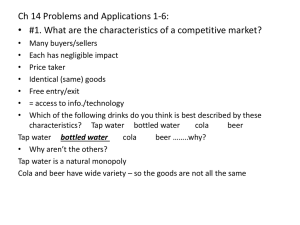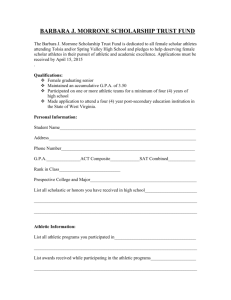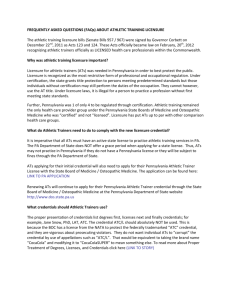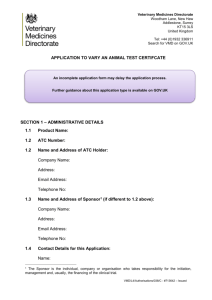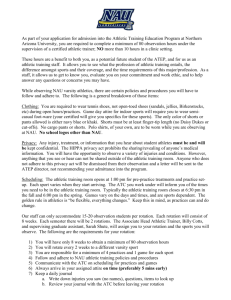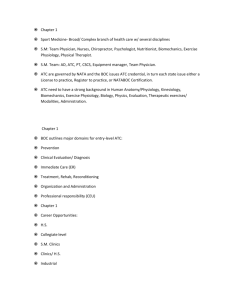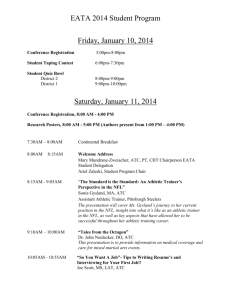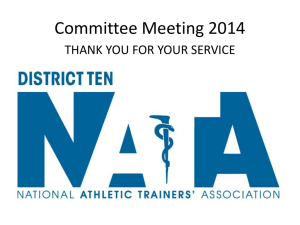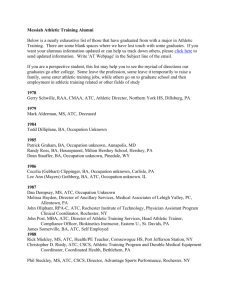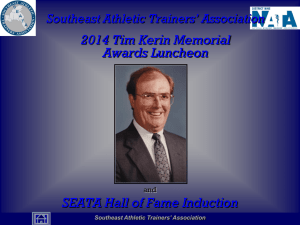Career research paper
advertisement
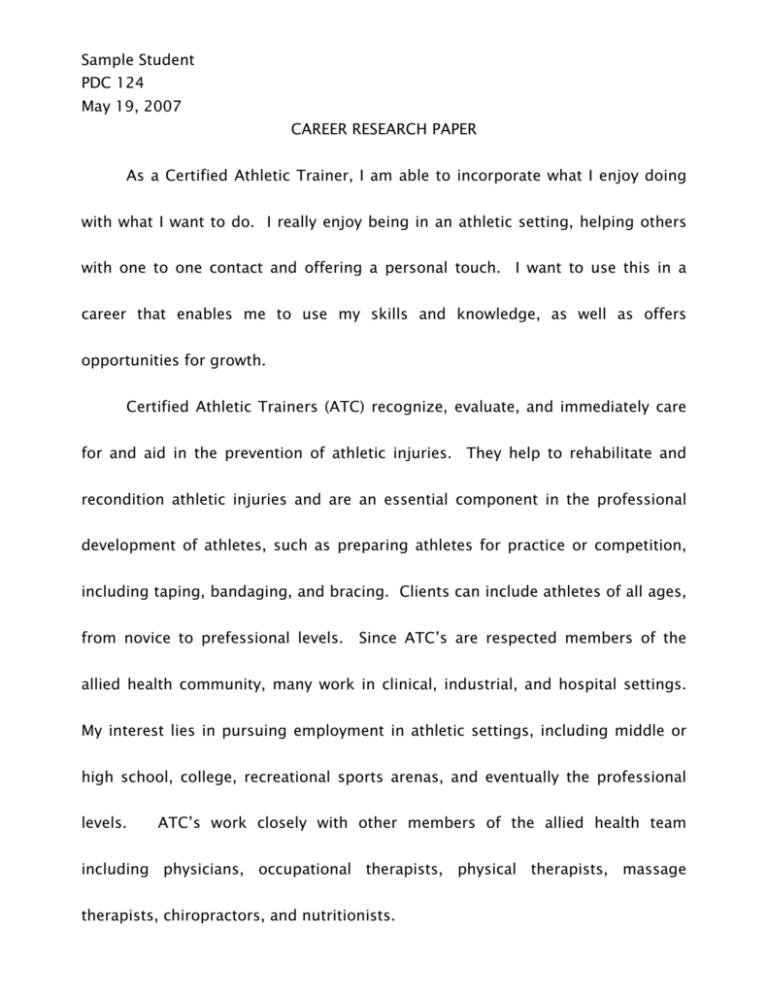
Sample Student PDC 124 May 19, 2007 CAREER RESEARCH PAPER As a Certified Athletic Trainer, I am able to incorporate what I enjoy doing with what I want to do. I really enjoy being in an athletic setting, helping others with one to one contact and offering a personal touch. I want to use this in a career that enables me to use my skills and knowledge, as well as offers opportunities for growth. Certified Athletic Trainers (ATC) recognize, evaluate, and immediately care for and aid in the prevention of athletic injuries. They help to rehabilitate and recondition athletic injuries and are an essential component in the professional development of athletes, such as preparing athletes for practice or competition, including taping, bandaging, and bracing. Clients can include athletes of all ages, from novice to prefessional levels. Since ATC’s are respected members of the allied health community, many work in clinical, industrial, and hospital settings. My interest lies in pursuing employment in athletic settings, including middle or high school, college, recreational sports arenas, and eventually the professional levels. ATC’s work closely with other members of the allied health team including physicians, occupational therapists, physical therapists, massage therapists, chiropractors, and nutritionists. P2. Career Research Paper Tarayna Babauta To be successful in this field, good social and communication skills, as well as a strong desire to help people, are essential, which are all traits I possess. Per the VALS Survey results, as an Experiencer, my energy finds outlet in exercise, sports, outdoor recreation, and social activities. Also, based on the results of my interest inventory, I am social, artistic, and enterprising, which means that I would enjoy working in an unstructured and flexible environment; working with and helping, nurturing, and caring for people; working in schools; and I have social, communication, and teaching skills. All these factors that are a part of me should serve me well in this profession. Organizational and time-management skills are also very important, and these I will need to improve on as I continue my education. The schedules of an ATC can vary depending on the work environment. Those that are employed in nonsport settings usually have a set schedule with nights and weekends off. Those that work in a sports related environment can have a more varied schedule. They need to be present for team practices and games, which can be at any time on any day, and schedules can change at a moment’s notice. Due to these variances, sports related ATC’s may have to work 6 or 7 days per week and possible late hours. P3. Career Research Paper Tarayna Babauta According to Kelley Meiers, an ATC at 24-Hour Fitness, on a typical day, an athletic trainer may train or rehabilitate existing clients for several hours, then spend several hours attempting to recruit new clients. Some time is also spent researching new information and techniques to offer their clients to assist them in achieving their goals. Kelley shared that there is a lot of room for advancement, which she loves about her profession, and that a large part of what she’s learned has been via hands-on experiences. She recommends learning all you can through mentors, the internet, workshops, etc. Most ATC’s work full time and receive benefits. Salaries vary greatly depending on the setting in which the trainer works. The average annual earnings is $36,075 (NATA 2005), but can get up to $65,000. ATC’s that work for professional teams may earn up to $150,00 annually. Career opportunities for ATC’s is very good. It is expected to grow faster than the average for all occupations through 2014, due to the demand for health care and employees turn to on-site help to prevent injuries and provide immediate treatment for any injuries that do happen. The licensure requirements and increased legislation has led to ATC’s being accepted as qualified health providers by the American Medical Association, as P4. Career Research Paper Tarayna Babauta ATC’s usually work under the direction of physicians and provide immediate care for injuries. Some of the other occupations that are related to ATC’s are recreational therapists, occupational therapists, respiratory therapists, physician assistants, and registered nurses. The minimum qualifications for becoming an ATC are a Bachelor’s Degree, usually in Kinesiology or Physical Education, from an accredited college or university and successful passing of a comprehensive, three-part (written, written simulation, practical) examination proxied by the National Athletic Training Association (NATA) Board of Certification. This is the entry-level credential and is required by most employers. Also required to maintain certification, an ATC must accumulate 75 hours of continuing education and recertification in CPR every three years. To help students achieve their degree, the NATA Research and Education Foundation offers scholarships in three areas: • Undergraduate: for college students in their junior year • Curriculum: for college students in their junior year of a curriculum program • Postgraduate: for college students in their final year of undergraduate education or graduates of an undergraduate program P5. Career Research Paper The NATA is a Tarayna Babauta non-profit organization dedicated to advancing, encouraging, and improving the athletic training profession through improving athletes’ health and well-being, public awareness, and education. Being a Certified Athletic Trainer may not necessarily be a high-paying profession, but it will enable me to utilize my knowledge, skills, and training, coupled with my personality strengths, interests, values, and desire to help others, in reaching their athletic potential. WORKS CITED "Collegescope." CHOICES Assessment. 17 May 2007 <www.humanesources.com>. "Collegescope." DWYA Assessment. 17 May 2007 <www.humanesources.com>. Lockard, C Brett. Occupational Outlook Quarterly. Athletic Trainers, 2005. Meiers, Kelley. Telephone interview. 18 May 2007. National Athletic Trainers Association. 18 May 2007 <www.nata.org>. "US Department of Labor." Occupational Outlook Handbook. 17 May 2007


